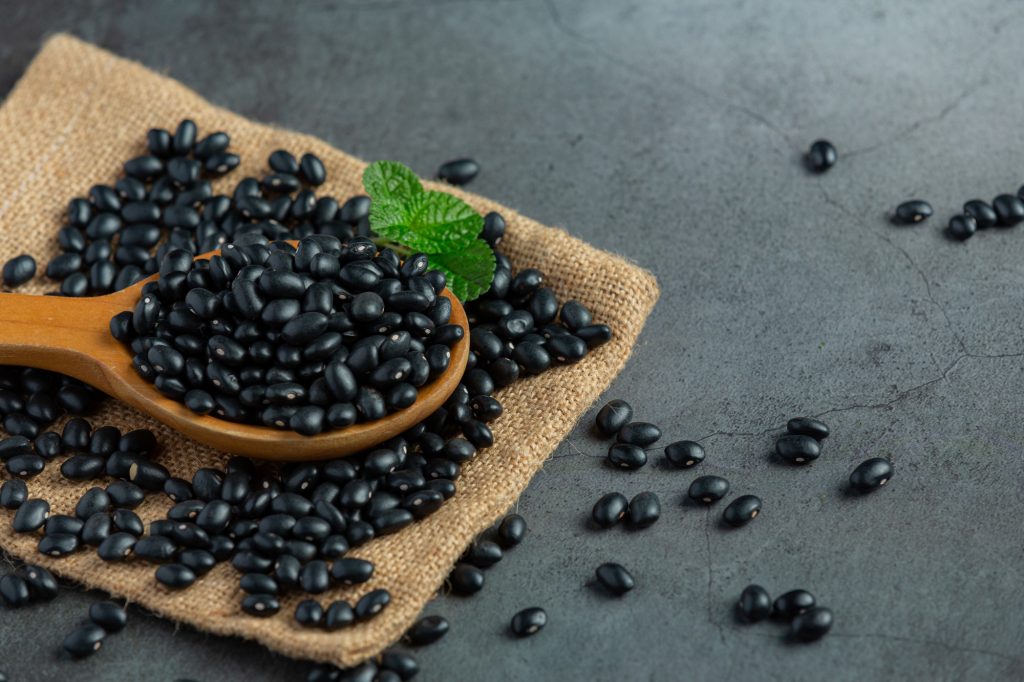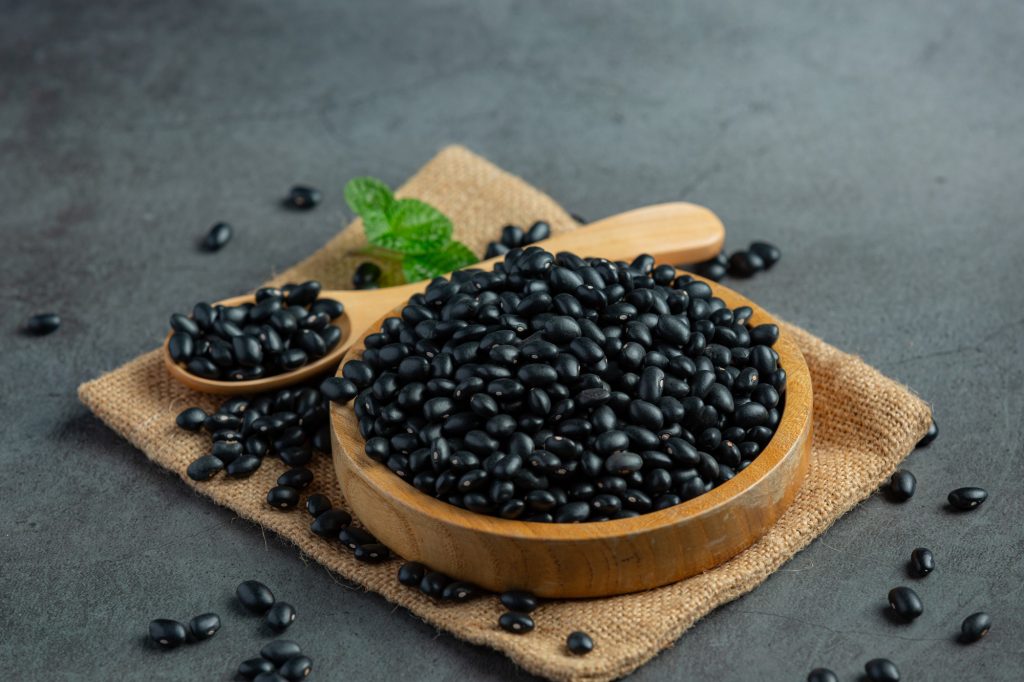Learn about the numerous benefits of incorporating black beans into your diet.
Discover the Benefits of Black Beans in Your Diet
Are you looking for a delicious and nutritious addition to your diet? Look no further than black beans! These little powerhouses of goodness are not only packed with flavor, but they also offer a wide range of health benefits. From providing essential nutrients to promoting weight management and supporting heart health, black beans have got it all. So, let’s dive into their remarkable nutritional profile and explore the many reasons why you should consider incorporating black beans into your meals.
Understanding the Nutritional Profile of Black Beans
Black beans are a nutritional powerhouse, boasting an impressive array of vitamins, minerals, and other important nutrients. Let’s take a closer look at some of the key benefits they offer:

The Powerhouse of Protein
Protein is an essential macronutrient that plays a crucial role in building and repairing tissues, producing enzymes and hormones, and maintaining a healthy immune system. Black beans are rich in protein, making them an excellent choice for vegetarians and vegans looking to meet their protein needs. So, if you’re tired of the same old protein sources, give black beans a try!
Not only are black beans a great source of protein, but they also contain all the essential amino acids that our bodies need. These amino acids are the building blocks of protein and are necessary for various bodily functions. By including black beans in your diet, you can ensure that you’re getting a complete protein source.
Furthermore, black beans are a low-fat source of protein, making them a healthier option compared to animal-based protein sources that may be high in saturated fat. This makes black beans a great choice for individuals looking to maintain a healthy weight or improve their cardiovascular health.
Rich in Fiber and Digestive Health
Fiber is another star nutrient found abundantly in black beans. Fiber not only aids in digestion but also promotes feelings of fullness, making it a valuable tool for weight management. By including black beans in your meals, you can help regulate your appetite and prevent overeating.
Moreover, the fiber in black beans acts as a prebiotic, providing nourishment for the beneficial bacteria in your gut. These bacteria play a crucial role in maintaining a healthy digestive system and supporting overall gut health. A healthy gut microbiome has been linked to various health benefits, including improved immune function and reduced risk of certain diseases.
Additionally, the high fiber content of black beans helps promote regular bowel movements and prevents constipation. This can contribute to a healthier digestive system and reduce the risk of developing gastrointestinal issues.
It’s worth noting that black beans are also a good source of resistant starch, a type of fiber that resists digestion in the small intestine. Resistant starch acts as a prebiotic and provides fuel for the beneficial bacteria in your colon, further supporting digestive health.
Loaded with Essential Vitamins and Minerals
In addition to protein and fiber, black beans are also packed with a wide range of essential vitamins and minerals. They are a great source of folate, iron, magnesium, and potassium – all of which are important for maintaining optimal health.
Folate, also known as vitamin B9, is essential for DNA synthesis and cell division. It plays a crucial role in the production of red blood cells and is particularly important for pregnant women as it helps prevent neural tube defects in developing fetuses.
Iron is vital for the production of hemoglobin, a protein in red blood cells that carries oxygen throughout the body. A deficiency in iron can lead to anemia, resulting in fatigue, weakness, and impaired cognitive function. Including black beans in your diet can help meet your iron needs and prevent iron deficiency.
Magnesium is involved in numerous biochemical reactions in the body and is essential for maintaining normal nerve and muscle function, regulating blood sugar levels, and supporting a healthy immune system. Consuming black beans can contribute to your daily magnesium intake and support overall health.
Potassium is an electrolyte that plays a crucial role in maintaining proper fluid balance, regulating blood pressure, and supporting heart health. Including black beans in your diet can help ensure you’re meeting your potassium needs and promote cardiovascular well-being.
With black beans on your plate, you can be sure your body is getting the nourishment it needs. These nutrient-dense legumes offer a wide range of vitamins and minerals, making them a valuable addition to any balanced diet.
The Role of Black Beans in Weight Management
If shedding a few pounds or maintaining a healthy weight is your goal, black beans can be a valuable ally in your journey. Here’s how they can help:
Feeling Full: The Satiety Effect of Black Beans
Unlike foods loaded with empty calories, black beans are nutrient-dense, meaning they contain a wealth of vital nutrients without an excessive amount of calories. As mentioned earlier, black beans are high in fiber, which helps you feel fuller for longer, reducing the temptation to snack on unhealthy foods throughout the day.
But what exactly is it about black beans that make them so satisfying? Well, it’s all thanks to their unique combination of soluble and insoluble fiber. Soluble fiber forms a gel-like substance in your digestive system, which slows down the absorption of carbohydrates and helps regulate blood sugar levels. On the other hand, insoluble fiber adds bulk to your stool, promoting healthy digestion and preventing constipation.
Additionally, black beans are a great source of resistant starch, a type of carbohydrate that resists digestion in the small intestine. This means that it passes through to the large intestine, where it acts as a prebiotic, feeding the beneficial bacteria in your gut. These bacteria produce short-chain fatty acids, which have been shown to reduce appetite and promote feelings of fullness.
So, if you’re looking to curb those cravings and manage your weight more effectively, black beans are an excellent choice!
Low in Fat, High in Nutrients
When it comes to weight management, finding foods that are low in fat but still packed with nutrients is a real win-win situation. Black beans fit the bill perfectly! They are naturally low in fat, making them a great alternative to higher-fat protein sources.
But don’t be fooled by their low-fat content – black beans are bursting with essential nutrients. They are an excellent source of folate, a B-vitamin that plays a crucial role in cell growth and development. Folate is especially important for pregnant women, as it helps prevent birth defects. Black beans also provide a good amount of iron, magnesium, and potassium, which are essential minerals for overall health and well-being.
Furthermore, the combination of their protein and fiber content helps to keep you satisfied, making it easier to stick to your weight loss or maintenance goals. Protein is known to increase satiety and reduce hunger, while fiber adds bulk to your meals, promoting a feeling of fullness.
So, say goodbye to bland and boring diet foods and say hello to the deliciousness of black beans! Whether you enjoy them in soups, salads, or as a filling for tacos, black beans are a versatile and nutritious addition to any weight management plan.
Black Beans and Heart Health
Having a healthy heart is essential for overall well-being, and black beans can contribute to keeping your ticker in top shape. Let’s explore their heart-healthy benefits:
Lowering Blood Pressure Naturally
High blood pressure is a major risk factor for heart disease, and adopting a heart-healthy diet is crucial for its management. Black beans contain potassium, a mineral known to help lower blood pressure levels. By incorporating black beans into your diet, you can give your heart a helping hand and potentially reduce your risk of developing cardiovascular problems. It’s a small change that can have a big impact!
Reducing Cholesterol with Black Beans
Elevated levels of LDL (low-density lipoprotein) cholesterol, commonly known as “bad” cholesterol, can increase the risk of heart disease. The good news is that black beans can play a role in reducing LDL cholesterol levels. Their soluble fiber content helps to bind cholesterol in the digestive tract, preventing its absorption into the bloodstream. So, by enjoying a hearty bowl of black bean goodness, you’re taking positive steps towards a healthier heart!
Black Beans and Blood Sugar Control
Managing blood sugar levels is essential for individuals with diabetes or those at risk of developing the condition. Here’s how black beans can help:
The Low Glycemic Index Advantage
The glycemic index (GI) ranks foods based on how quickly they raise blood sugar levels. Foods with a high GI can cause blood sugar spikes, while those with a low GI help to keep them more stable. Black beans have a low GI, making them a great choice for individuals with diabetes or those looking to manage their blood sugar levels. So, swap out those high-GI foods and incorporate black beans into your daily diet for better blood sugar control!
Preventing Diabetes with Regular Black Bean Consumption
Research suggests that consuming black beans regularly may help reduce the risk of developing type 2 diabetes. The fiber and protein content of black beans can contribute to improved insulin sensitivity and blood sugar regulation. By including black beans in your meals, you’re not only treating your taste buds but also taking steps towards preventing diabetes and maintaining optimal health.
How to Incorporate Black Beans into Your Diet
Now that you know all about the incredible benefits of black beans, you’re probably eager to enjoy their goodness. Here are some easy and delicious ways to incorporate black beans into your diet:

Delicious and Nutritious Black Bean Recipes
From savory soups and stews to flavorful salads and mouthwatering burgers, the possibilities are endless when it comes to black bean recipes. Try making a black bean and corn salad with diced tomatoes, avocado, and a squeeze of lime juice for a refreshing side dish. Or how about a hearty black bean chili packed with spices and topped with a dollop of Greek yogurt? Get creative in the kitchen and let black beans be the star of your next meal!
Tips for Cooking and Storing Black Beans
If you prefer cooking your own black beans rather than opting for canned varieties, here are a few tips to make the process easier. Start by rinsing the beans thoroughly to remove any dirt or debris. Then, soak them in water overnight or for at least 8 hours. After soaking, cook the beans in fresh water until they are tender. Once cooked, you can store them in the refrigerator for up to a week or freeze them for longer-term storage. Having cooked black beans on hand makes it simple to add a healthy dose of protein and fiber to your meals whenever you’re in the mood!
In conclusion, black beans are not only a delicious addition to your meals but also a nutritional powerhouse with numerous health benefits. From providing essential nutrients and supporting weight management to promoting heart health and blood sugar control, they truly deserve a spot on your plate. So, go ahead and experiment with incorporating black beans into your diet and discover a world of flavor, nourishment, and well-being!







